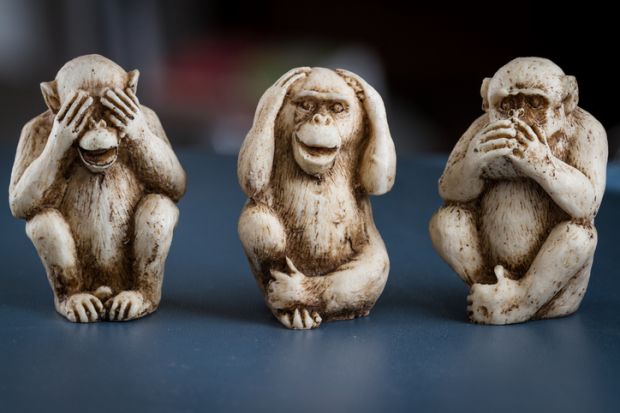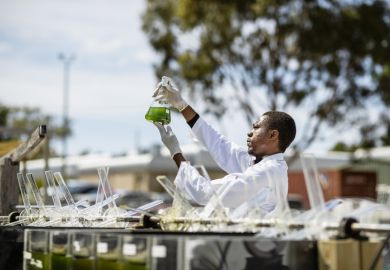Last week, I was surprised and delighted to hear Twitter academics making a loud case for the ethical review of research.
I’ve been my department’s director of ethics for over seven years, served on innumerable and interminable research ethics working groups and been a member of UCL’s Research Ethics Committee for four years. I am largely unfamiliar with academics demanding more ethical oversight of research.
This sea change in academic attitudes was sparked by a journal article in the well-regarded Sage journal Qualitative Research, in which a University of Manchester PhD student, Karl Andersson, spent three months masturbating exclusively to Japanese shota images. Shota, he explains, is “a Japanese genre of comics and illustrations that feature young boy characters in a cute or, most often, sexually explicit way”.
There was no indication in the paper that the “research” had received ethical review or that it was exempt from the need for it. This suggests that the journal editors and reviewers, as well as the author, saw no legal or ethical problems with this “study” or “research materials”. The author’s reflections on the latter are all positive. For example, he notes that “often, very young boy characters would greedily jump over the first cock that presented itself. That…worked for me”.
Yet possessing non-photographic pornographic images of a child is usually prohibited in the UK by the Coroners and Justice Act 2009.
Most academics on Twitter were aghast at the “study” and demanded to know how it had received ethical clearance. And, following an extended deluge of requests, the publishers and/or journal editors removed the article, published in April, from their website “due to ethical concerns surrounding this article and the social harm being caused by the publication of this work”.
But was ethical review really required when there were no study participants to protect from harm or give informed consent?
Manchester’s research ethics policy indicates that “research involving sensitive topics” requires ethical approval, but only after a long list of points regarding human participants, implying that it is only sensitive research involving humans that requires approval. Research entailing potentially illegal or harmful activities is only flagged as requiring ethical approval if the research is likely to uncover such activities, presumably because participants may be engaged in them.
To be fair, more recent statements from Manchester and the journal make it clear that Andersson’s “research” was not conducted under Manchester’s auspices. One of the student’s own YouTube videos also notes that his doctoral fieldwork plan had “failed thoroughly” to get ethical approval. Without apparent irony, he adds that ethics are paramount in research.
The journal editors are all at Cardiff University School of Social Sciences. The university’s research ethics webpage says research with human participants requires ethical review, but gives little detail. And its Research Integrity and Governance Code of Practice has nothing further of relevance.
The journal itself is a member of the Committee on Publication Ethics, but the committee’s focus is on the publication process itself. Research ethics are merely touched on in a flow chart.
The journal editors’ recent statement acknowledges that they “have wider and overarching responsibilities with respect to difficult or sensitive topics to ensure that work accepted for publication does not cause harm, and we did not fulfil this responsibility with respect to this note”. They observe that the potential for harm includes that the publication “could be used to legitimise and contribute to child sexual abuse”.
It is frankly disturbing that it took a public furore for the editors to recognise this potential for harm. In contrast, commentators recognised this potential immediately. Police are now reportedly investigating and the student has been suspended.
Universities UK’s Concordat to Support Research Integrity asks organisations to have policies emphasising the importance of researchers conducting legal and ethical research and to offer support for researchers to achieve this, but doesn’t specify anything about ethical review. And while the UK Research Integrity Office’s Code of Practice For Research requires researchers to comply with legal requirements and organisations to “set up systems to ensure that when there are risks that proposed research or its results may be misused for purposes that are illegal or harmful, those risks are identified and addressed”, it seems not to anticipate the possibility of research being designed to include illegal or harmful activities.
The Andersson case demonstrates that such provisions are not enough. Universities need to direct researchers to seek ethical review when their research might include or enable illegality or harm. Journals likewise need systems to help them detect potentially problematic research. Research involving illegal activities can be beneficial, but it is a complex area where the researcher has responsibilities to the university, as well as to participants and society more broadly. The research would have to be extremely well justified; legal and other expert input may be necessary, and mitigating measures would need to be developed.
Journal and ethics reviewers must also be prepared to challenge researchers on the fundamentals of their research. Not all researchers have good intentions and some research can create the risk of real harm, irrespective of intention. Research ethics committee members, as well as journal reviewers and editors, are subject to peer pressure, yet, they must resist it. As UKRIO puts it, universities and researchers “are ultimately accountable to the general public and should act accordingly”. If we don’t, public trust will decline.
The publication of this paper has possibly damaged the reputation of the student’s university, the method he claims to employ and the humanities in general. This cannot be blamed on the Conservative MP who tweeted in fury about the paper (and extrapolated too widely). Nor can it be laid at the feet of the national and international media that, unsurprisingly, cashed in on the story.
This is on us. We are supervisors, reviewers and editors. If we see research that could cause harm, even indirectly, we must speak up.
Michelle Shipworth is an associate professor in energy and social sciences at UCL.
Register to continue
Why register?
- Registration is free and only takes a moment
- Once registered, you can read 3 articles a month
- Sign up for our newsletter
Subscribe
Or subscribe for unlimited access to:
- Unlimited access to news, views, insights & reviews
- Digital editions
- Digital access to THE’s university and college rankings analysis
Already registered or a current subscriber?







